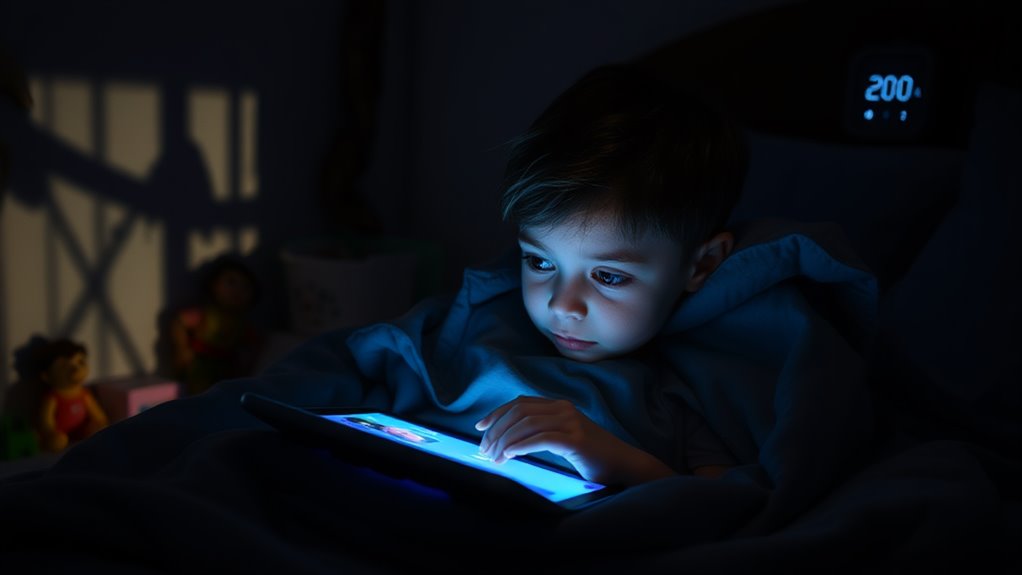Screen Time and Sleep Disruption in Children
You might not realize how much screen time is impacting your child’s sleep. With the pervasive use of devices, it’s easy to overlook the effects of blue light on their ability to wind down. Studies show that excessive screen exposure can hinder melatonin production, leading to restless nights and anxious days. As a parent, you may be wondering how to strike a balance between technology and healthy sleep habits. What steps can you take to guarantee your child gets the rest they need?
Understanding Sleep Patterns
As night falls, understanding sleep patterns becomes essential for parents concerned about their children’s well-being. You might wonder, “What’s the big deal?” Well, kids need good sleep to grow, learn, and just be their awesome selves.
A child’s sleep cycle usually consists of several stages, including light sleep, deep sleep, and REM sleep, which is vital for dreaming and learning.
Did you know that kids typically need between 9 to 12 hours of sleep, depending on their age? That’s like charging a phone; if they don’t get enough, they won’t function properly the next day. You might notice your child getting cranky or having trouble focusing. Yikes! Those are signs they need some more z’s.
Creating a bedtime routine helps signal to your child that it’s time to wind down. This can include reading a book, dimming the lights, or even some relaxing music.
Just think of it as setting the stage for a great night’s sleep. Remember, your child’s good sleep is a team effort. So, keep an eye on their sleep patterns, and soon enough, you’ll find the perfect balance for sweet dreams!
Effects of Screen Time
Screen time can considerably disrupt your child’s sleep patterns and overall health. You might think that a little screen time is harmless, but those bright lights and exciting games can keep your child awake longer than you’d like.
When your child’s glued to a screen before bed, it can be tough for them to wind down. The blue light from devices tricks their brain into thinking it’s still daytime, making it harder to fall asleep.
Imagine trying to catch some Z’s while your child is jumping from one video to the next! It’s no surprise that they might wake up feeling grumpy and tired the next day.
Plus, excessive screen time can lead to other issues like anxiety and trouble focusing in school.
You want your child to have energy for all the fun activities they love, right? So, consider setting limits on screen time, especially before bed.
Try creating a “no screens” rule in the hour leading up to bedtime. This way, you can help them develop better sleep habits, leading to happier days ahead!
Scientific Findings on Sleep Disruption
Research shows a strong connection between screen time and sleep disruption in children, highlighting the urgency of this issue. When you think about it, it makes sense! Those bright screens can trick your brain into thinking it’s still daytime.
Studies have found that kids who spend more time on devices often have a harder time falling asleep and staying asleep. You might even notice that after binge-watching your favorite show, you’re more wired than tired!
The blue light emitted by screens interferes with melatonin production, a hormone that helps regulate sleep. So, if you’re staring at a tablet or phone right before bed, your body might think it’s time to party instead of wind down.
This can lead to shorter sleep duration and restless nights, leaving you feeling groggy in the morning. Plus, it’s not just about how long you’re on your devices, but also what you’re doing.
Engaging with exciting games or action-packed videos can keep your mind racing. So, if you want sweet dreams, consider shutting down those screens a little earlier. Your body (and brain) will thank you!
Age-Related Screen Time Guidelines
Establishing age-related screen time guidelines is essential for guaranteeing healthy development in children. Think of it like setting limits on candy; too much can lead to trouble!
For toddlers, it’s best to keep screen time under one hour a day, focusing on high-quality content. You want to encourage interactive experiences, not just passive watching.
As kids grow into preschoolers, aim for about one hour of screen time daily, again prioritizing educational shows and apps. This can help them learn while still keeping their imaginations active.
School-aged kids, however, can handle a bit more, so consider allowing up to two hours of recreational screen time.
Just remember, balance is key! It’s important to combine screen time with physical activities and face-to-face interactions. You don’t want screens to take away from playtime or family fun.
As your child reaches their teenage years, it’s a good idea to keep an open conversation about their screen use.
While they may need more time for homework or socializing, encourage breaks and guarantee they’re still getting enough sleep. After all, a well-rested child is a happy child!
Practical Tips for Parents
Maneuvering the world of screen time can feel overwhelming for parents, but there are practical strategies you can implement to guarantee a healthy balance.
First, set clear limits on daily screen use. Consider using a timer—think of it as a friendly reminder that “screen time’s up!”
Next, create tech-free zones in your home, like the dinner table or bedrooms. This helps everyone focus on each other rather than the latest app.
You might also want to be a role model. If your kids see you enjoying other activities, like reading or playing outside, they’ll be more likely to follow suit.
Encourage family activities that don’t involve screens, like board games or bike rides. These moments can be fun and create lasting memories!
Lastly, keep an eye on the content your child consumes. Make sure it’s age-appropriate and educational.
Discuss what they watch, so you can share ideas and even have a good laugh together.
Encouraging Healthy Sleep Habits
Getting enough sleep is essential for your child’s development and well-being. You can encourage healthy sleep habits by creating a bedtime routine that’s both relaxing and fun. Start by setting a consistent bedtime, even on weekends. It helps your child’s body know when to wind down.
Next, consider dimming the lights an hour before sleep. This signals to their brain that it’s time to relax. You can also swap screen time for some bedtime stories or calming music. Trust me, those stories can spark imagination while calming their minds—way better than scrolling through a tablet!
Make their sleep environment cozy, too. A soft blanket, a favorite stuffed animal, and a dark room can work wonders. If your child is still fidgeting or feeling restless, try some gentle stretching or deep breathing exercises together.
Lastly, be a role model. Show them that you value sleep by practicing good habits yourself. It’s easier when everyone’s on the same page!




